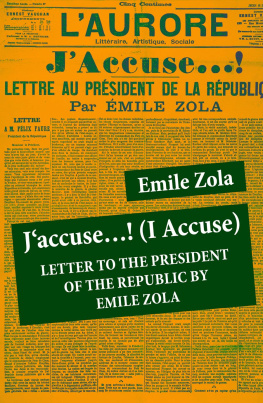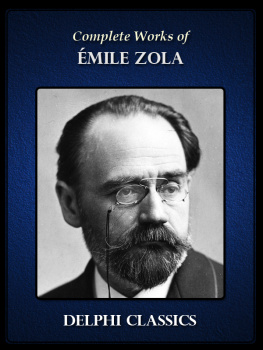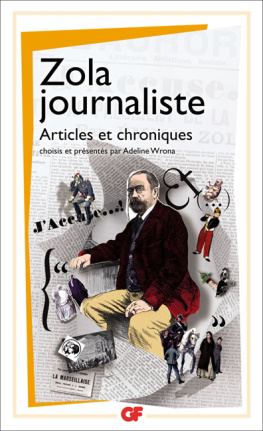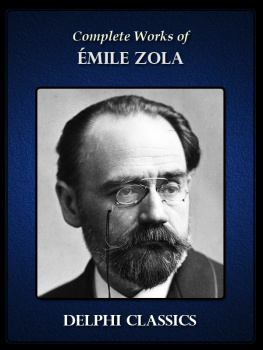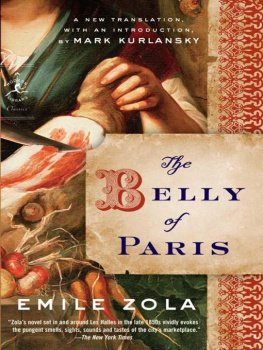I ACCUSE... !
Letter to Mr. Flix Faure, President of the Republic
Mr. President,
Would you allow me, in my gratitude for the benevolent reception that you gave me one day, to draw the attention of your rightful glory and to tell you that your star, so happy until now, is threatened by the most shameful and most ineffaceable of blemishes?
You have passed healthy and safe through base calumnies; you have conquered hearts. You appear radiant in the apotheosis of this patriotic festival that the Russian alliance was for France, and you prepare to preside over the solemn triumph of our World Fair, which will crown our great century of work, truth and freedom. But what a spot of mud on your name I was going to say on your reign is this abominable Dreyfus affair! A council of war, under order, has just dared to acquit Esterhazy, a great blow to all truth, all justice. And it is finished, France has this stain on her cheek, History will write that it was under your presidency that such a social crime could be committed.
Since they dared, I too will dare. The truth I will say, because I promised to say it, if justice, regularly seized, did not do it, full and whole. My duty is to speak, I do not want to be an accomplice. My nights would be haunted by the specter of innocence that suffer there, through the most dreadful of tortures, for a crime it did not commit.
And it is to you, Mr. President, that I will proclaim it, this truth, with all the force of the revulsion of an honest man. For your honor, I am convinced that you are unaware of it. And with whom will I thus denounce the criminal foundation of these guilty truths, if not with you, the first magistrate of the country?
*
First, the truth about the lawsuit and the judgment of Dreyfus.
A nefarious man carried it all out, did everything: Lieutenant Colonel Du Paty de Clam, at that time only a Commandant. He is the entirety of the Dreyfus business; it will be known only when one honest investigation clearly establishes his acts and responsibilities. He seems a most complicated and hazy spirit, haunting romantic intrigues, caught up in serialized stories, stolen papers, anonymous letters, appointments in deserted places, mysterious women who sell condemning evidences at night. It is he who imagined dictating the Dreyfus memo; it is he who dreamed to study it in an entirely hidden way, under ice; it is him whom commander Forzinetti describes to us as armed with a dark lantern, wanting to approach the sleeping defendant, to flood his face abruptly with light and to thus surprise his crime, in the agitation of being roused. And I need hardly say that that what one seeks, one will find. I declare simply that commander Du Paty de Clam, charged to investigate the Dreyfus business as a legal officer, is, in date and in responsibility, the first culprit in the appalling miscarriage of justice committed.
The memo was for some time already in the hands of Colonel Sandherr, director of the office of information, who has since died of general paresis. Escapes took place, papers disappeared, as they still do today; the author of the memo was sought, when ahead of time one was made aware, little by little, that this author could be only an officer of the High Comman and an artillery officer: a doubly glaring error, showing with which superficial spirit this affair had been studied, because a reasoned examination shows that it could only be a question of an officer of troops. Thus searching the house, examining writings, it was like a family matter, a traitor to be surprised in the same offices, in order to expel him. And, while I dont want to retell a partly known history here, Commander Paty de Clam enters the scene, as soon as first suspicion falls upon Dreyfus. From this moment, it is he who invented Dreyfus, the affair becomes that affair, made actively to confuse the traitor, to bring him to a full confession. There is the Minister of War, General Mercier, whose intelligence seems poor; there are the head of the High Command, General De Boisdeffre, who appears to have yielded to his clerical passion, and the assistant manager of the High Command, General Gonse, whose conscience could put up with many things. But, at the bottom, there is initially only Commander Du Paty de Clam, who carries them all out, who hypnotizes them, because he deals also with spiritism, with occultism, conversing with spirits. One could not conceive of the experiments to which he subjected unhappy Dreyfus, the traps into which he wanted to make him fall, the insane investigations, monstrous imaginations, a whole torturing insanity.
Ah! this first affair is a nightmare for those who know its true details! Commander Du Paty de Clam arrests Dreyfus, in secret. He turns to Mrs. Dreyfus, terrorizes her, says to her that, if she speaks, her husband is lost. During this time, the unhappy one tore his flesh, howled his innocence. And the instructions were made thus, as in a 15th century tale, shrouded in mystery, with a savage complication of circumstances, all based on only one childish charge, this idiotic affair, which was not only a vulgar treason, but was also the most impudent of hoaxes, because the famously delivered secrets were almost all without value. If I insist, it is that the kernel is here, from whence the true crime will later emerge, the terrible denial of justice from which France is sick. I would like to touch with a finger on how this miscarriage of justice could be possible, how it was born from the machinations of Commander Du Paty de Clam, how General Mercier, General De Boisdeffre and General Gonse could be let it happen, to engage little by little their responsibility in this error, that they believed a need, later, to impose like the holy truth, a truth which is not even discussed. At the beginning, there is not this, on their part, this incuriosity and obtuseness. At most, one feels them to yield to an ambiance of religious passions and the prejudices of the physical spirit. They allowed themselves a mistake.
But here Dreyfus is before the council of war. Closed doors are absolutely required. A traitor would have opened the border with the enemy to lead the German emperor to Notre-Dame, without taking measures to maintain narrow silence and mystery. The nation is struck into a stupor, whispering of terrible facts, monstrous treasons which make History indignant; naturally the nation is so inclined. There is no punishment too severe, it will applaud public degradation, it will want the culprit to remain on his rock of infamy, devoured by remorse. Is this then true, the inexpressible things, the dangerous things, capable of plunging Europe into flames, which one must carefully bury behind these closed doors? No! There was behind this, only the romantic and lunatic imaginations of Commander Paty de Clam. All that was done only to hide the most absurd of novella plots. And it suffices, to ensure oneself of this, to study with attention the bill of indictment, read in front of the council of war.
Ah! the nothingness of this bill of indictment! That a man could be condemned for this act, is a wonder of iniquity. I defy decent people to read it, without their hearts leaping in indignation and shouting their revolt, while thinking of the unwarranted suffering, over there, on Devils Island. Dreyfus knows several languages, crime; one found at his place no compromising papers, crime; he returns sometimes to his country of origin, crime; he is industrious, he wants to know everything, crime; he is unperturbed, crime; he is perturbed, crime. And the naivet of drafting formal assertions in a vacuum! One spoke to us of fourteen charges: we find only one in the final analysis, that of the memo; and we even learn that the experts did not agree, than one of them, Mr. Gobert, was coerced militarily, because he did not allow himself to reach a conclusion in the desired direction. One also spoke of twenty-three officers who had come to overpower Dreyfus with their testimonies. We remain unaware of their interrogations, but it is certain that they did not all charge him; and it is to be noticed, moreover, that all belonged to the war offices. It is a family lawsuit, one is there against oneself, and it is necessary to remember this: the High Command wanted the lawsuit, it was judged, and it has just judged it a second time.

